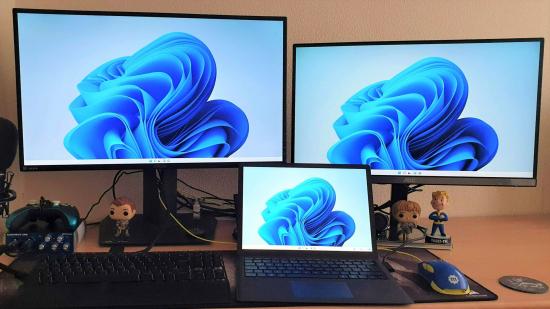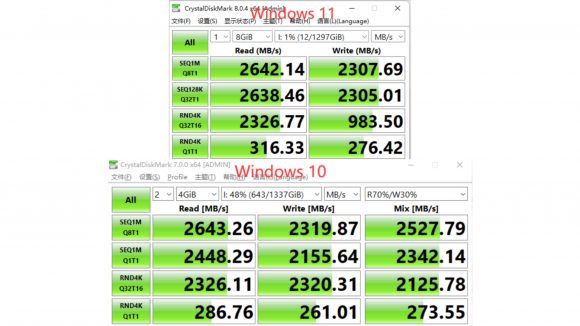Windows 11 is slowly but surely increasing in popularity among Steam users, but Microsoft still has some kinks to iron out before it’s fully ready for gaming PCs. Several reports on Microsoft’s support forums (via Neowin) show that the operating system is playing havoc with NVMe SSD speeds, as some storage slows to a crawl in comparison to Windows 10. Worse yet, the problem has existed for at least three months, as it was identified on Reddit before Windows 11 launched to the public.
The issue seems to affect people in different ways. Some report that their drive’s random 4K write performance drags its feet by more than half of its rated speed in CrystalDiskMark and AS-SSD benchmarking tools, while the same device on Windows 10 chugs away as intended. In other instances, read speeds are also affected, and there are even lower input/output operations per second (IOPS).
Some of the biggest drops come from PCIe Gen 4 SSDs because of their higher speed ceiling, but that doesn’t mean PCIe Gen 3 are safe from the issue, as both don’t fare well under Windows 11.
Currently, the cause is unknown, but the community is hard at work troubleshooting. The running theory is that drives containing the Windows 11 installation are affected worse than secondary storage, while others suggest that Windows drivers could be the heart of the issue. Windows 11’s build 22000.348 update seems to have improved things to some extent, but they aren’t quite where they should be.
Microsoft originally addressed the issue three months ago when it was raised on Reddit, but hasn’t provided any updates since. We’ve reached out for comments. Hopefully the upcoming build 22518 preview provides some fixes, but we’ll need to wait for the build to make it public before we can run tests of our own.
This isn’t the only bug to make Windows 11 less than desirable for games, as it’s recently struggled with RAM leaks and didn’t play nicely with AMD Ryzen CPUs, decreasing performance by up to 15%.

